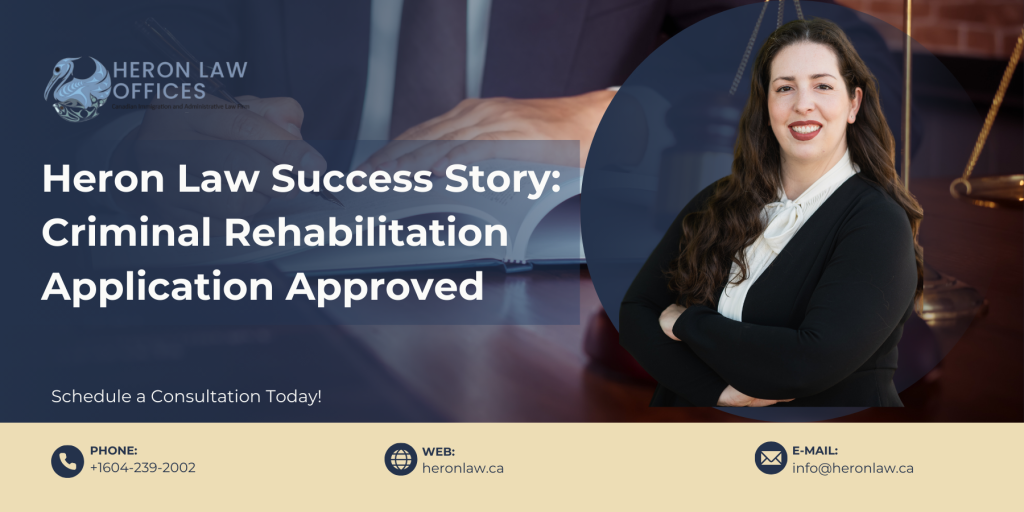By Laura Schemitsch, Canadian Immigration and Refugee Lawyer
Our client, originally self-represented, submitted an application for a working holiday visa through International Experience Canada (IEC) in the spring of 2022. The Applicant’s spouse also applied for a working holiday visa which was accepted quickly. After eight months, the Applicant had not received any updates on their work permit application and began following up on the application through IRCC Webform.
One year after submitting the working holiday visa application, the Applicant consulted with me to inquire about the delayed application. The Applicant explained they were convicted of two driving offences a decade previously when they were much younger but did not apply for criminal rehabilitation. It became apparent that our client may be criminally inadmissible to Canada under subsection 36(2) of the Immigration and Refugee Protection Act, which likely explained the delay in processing. I was retained to prepare and submit a rehabilitation application to attach to the ongoing work permit application, in order to prevent a finding of criminal inadmissibility.
Through an Access to Information Request, we determined that our client’s working holiday visa application had been transferred to a criminal rehabilitation assessment unit. We prepared a criminal rehabilitation application that detailed the circumstances surrounding the past offences and provided substantial proof of rehabilitation and legal submissions. The application was submitted in October 2023 and approved one year later. The Applicant’s spouse has been living in Canada since 2022, and fortunately, they are now able to be reunited following an indefinite period of separation.
Determining Inadmissibility
Are you inadmissible because of past criminal activity?
In general, temporary residents and applicants applying for permanent residence are considered to be criminally inadmissible if the person:
- was convicted of an offence in Canada;
- was convicted of an offence outside of Canada that is considered a crime in Canada; or
- committed an act outside of Canada that is considered a crime under the laws of the country where it occurred and would be punishable under Canadian law.
In order to determine inadmissibility, foreign convictions and laws are equated to Canadian law as if they had occurred in Canada.

Overcoming Criminal Inadmissibility
Convictions/offences outside Canada
If you were convicted of or committed a criminal offence outside Canada, you may overcome this criminal inadmissibility:
- by applying for rehabilitation, or
- you may be deemed to have been rehabilitated if at least ten years have passed since you completed the sentence imposed upon you, or since you committed the offence, if the offence is one that would, in Canada, be an indictable offence punishable by a maximum term of imprisonment of less than ten years.
If the offence is one that would, in Canada, be prosecuted summarily, and if you were convicted for two (2) or more such offences, the period for rehabilitation is at least five (5) years after the sentences imposed were served or are to be served.
Convictions/offences in Canada
If you have a criminal conviction in Canada, you must seek a record suspension (formerly a pardon) from the Parole Board of Canada (PBC) before you will be admissible to Canada.
Convictions in Canada and convictions or offences outside of Canada
If you have convictions in Canada and convictions or offences outside of Canada, both an approval of rehabilitation and a pardon are required to overcome your inadmissibility.
What is rehabilitation?
Rehabilitation removes the grounds of criminal inadmissibility. Rehabilitation means that you lead a stable lifestyle and that you are unlikely to be involved in any further criminal activity.
You are eligible to apply for rehabilitation if you have:
- committed an act outside of Canada and five (5) years have elapsed since the act;
- been convicted outside of Canada and five (5) years have passed since the end of the sentence imposed.
If you are concerned that you may be inadmissible to Canada, contact Heron Law Offices today for a consultation to determine your options.




